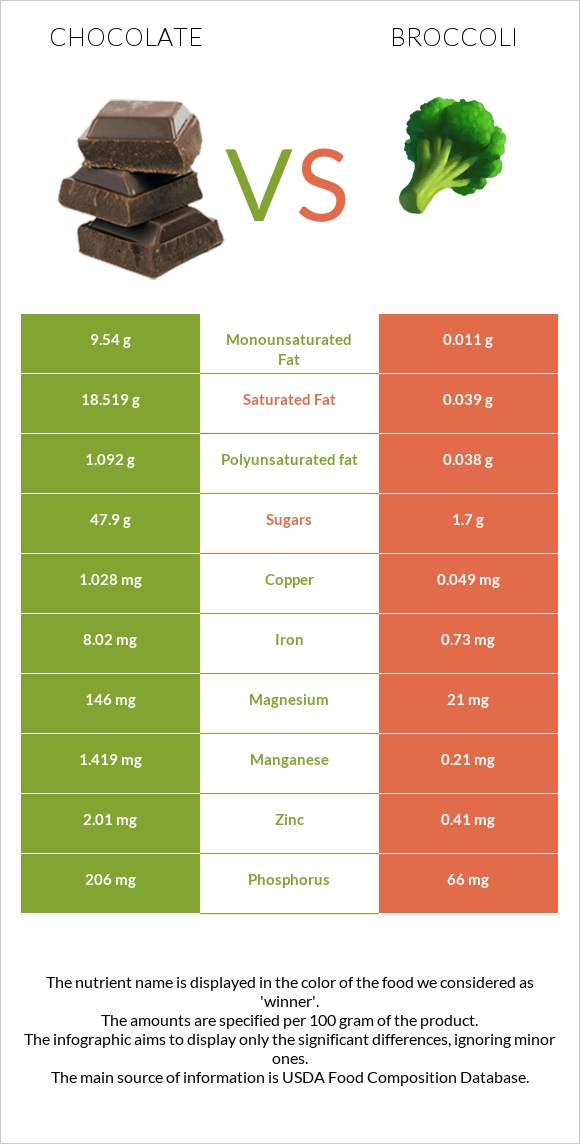Chocolate vs. Broccoli — In-Depth Nutrition Comparison
Compare
Important differences between chocolate and broccoli
- Chocolate has more copper, iron, manganese, magnesium, phosphorus, fiber, and zinc; however, broccoli is richer in vitamin K and vitamin A.
- Chocolate's daily need coverage for copper is 109% more.
- Chocolate contains 475 times more saturated fat than broccoli. Chocolate contains 18.519g of saturated fat, while broccoli contains 0.039g.
The food varieties used in the comparison are Chocolate, dark, 45- 59% cacao solids and Broccoli, raw.
Infographic

Infographic link
Mineral Comparison
Mineral comparison score is based on the number of minerals by which one or the other food is richer. The "coverage" charts below show how much of the daily needs can be covered by 300 grams of the food.
| Contains more MagnesiumMagnesium | +595.2% |
| Contains more CalciumCalcium | +19.1% |
| Contains more PotassiumPotassium | +76.9% |
| Contains more IronIron | +998.6% |
| Contains more CopperCopper | +1998% |
| Contains more ZincZinc | +390.2% |
| Contains more PhosphorusPhosphorus | +212.1% |
| Contains less SodiumSodium | -27.3% |
| Contains more ManganeseManganese | +575.7% |
| Contains more SeleniumSelenium | +20% |
Vitamin Comparison
Vitamin comparison score is based on the number of vitamins by which one or the other food is richer. The "coverage" charts below show how much of the daily needs can be covered by 300 grams of the food.
| Contains more Vitamin B3Vitamin B3 | +13.5% |
| Contains more Vitamin B12Vitamin B12 | +∞% |
| Contains more Vitamin AVitamin A | +1450% |
| Contains more Vitamin EVitamin E | +44.4% |
| Contains more Vitamin B1Vitamin B1 | +184% |
| Contains more Vitamin B2Vitamin B2 | +134% |
| Contains more Vitamin B5Vitamin B5 | +92.9% |
| Contains more Vitamin B6Vitamin B6 | +316.7% |
| Contains more Vitamin KVitamin K | +1154.3% |
All nutrients comparison - raw data values
| Nutrient |  |
 |
DV% diff. |
| Copper | 1.028mg | 0.049mg | 109% |
| Vitamin C | 89.2mg | 99% | |
| Iron | 8.02mg | 0.73mg | 91% |
| Saturated fat | 18.519g | 0.039g | 84% |
| Vitamin K | 8.1µg | 101.6µg | 78% |
| Manganese | 1.419mg | 0.21mg | 53% |
| Fats | 31.28g | 0.37g | 48% |
| Magnesium | 146mg | 21mg | 30% |
| Calories | 546kcal | 34kcal | 26% |
| Monounsaturated fat | 9.54g | 0.011g | 24% |
| Phosphorus | 206mg | 66mg | 20% |
| Carbs | 61.17g | 6.64g | 18% |
| Fiber | 7g | 2.6g | 18% |
| Folate | 63µg | 16% | |
| Zinc | 2.01mg | 0.41mg | 15% |
| Caffeine | 43mg | 0mg | 11% |
| Vitamin B6 | 0.042mg | 0.175mg | 10% |
| Vitamin B12 | 0.23µg | 0µg | 10% |
| Potassium | 559mg | 316mg | 7% |
| Polyunsaturated fat | 1.092g | 0.038g | 7% |
| Vitamin B5 | 0.297mg | 0.573mg | 6% |
| Vitamin B2 | 0.05mg | 0.117mg | 5% |
| Protein | 4.88g | 2.82g | 4% |
| Vitamin B1 | 0.025mg | 0.071mg | 4% |
| Cholesterol | 8mg | 0mg | 3% |
| Vitamin A | 2µg | 31µg | 3% |
| Choline | 18.7mg | 3% | |
| Vitamin E | 0.54mg | 0.78mg | 2% |
| Calcium | 56mg | 47mg | 1% |
| Selenium | 3µg | 2.5µg | 1% |
| Vitamin B3 | 0.725mg | 0.639mg | 1% |
| Fructose | 0g | 0.68g | 1% |
| Net carbs | 54.17g | 4.04g | N/A |
| Sugar | 47.9g | 1.7g | N/A |
| Sodium | 24mg | 33mg | 0% |
| Trans fat | 0.112g | 0g | N/A |
| Tryptophan | 0.033mg | 0% | |
| Threonine | 0.088mg | 0% | |
| Isoleucine | 0.079mg | 0% | |
| Leucine | 0.129mg | 0% | |
| Lysine | 0.135mg | 0% | |
| Methionine | 0.038mg | 0% | |
| Phenylalanine | 0.117mg | 0% | |
| Valine | 0.125mg | 0% | |
| Histidine | 0.059mg | 0% | |
| Omega-3 - EPA | 0.001g | 0g | N/A |
| Omega-3 - ALA | 0.085g | N/A | |
| Omega-6 - Eicosadienoic acid | 0.001g | 0g | N/A |
| Omega-6 - Linoleic acid | 0.947g | N/A |
Macronutrient Comparison
Macronutrient breakdown side-by-side comparison
| Contains more ProteinProtein | +73% |
| Contains more FatsFats | +8354.1% |
| Contains more CarbsCarbs | +821.2% |
| Contains more OtherOther | +95.4% |
| Contains more WaterWater | +9106.2% |
Fat Type Comparison
Fat type breakdown side-by-side comparison
| Contains more Mono. FatMonounsaturated fat | +86627.3% |
| Contains more Poly. FatPolyunsaturated fat | +2773.7% |
| Contains less Sat. FatSaturated fat | -99.8% |
Carbohydrate type comparison
Carbohydrate type breakdown side-by-side comparison
| Contains more SucroseSucrose | +46150% |
| Contains more LactoseLactose | +685.7% |
| Contains more GlucoseGlucose | +∞% |
| Contains more FructoseFructose | +∞% |
| Contains more MaltoseMaltose | +∞% |
~equal in
Starch
~0g
~equal in
Galactose
~0g





